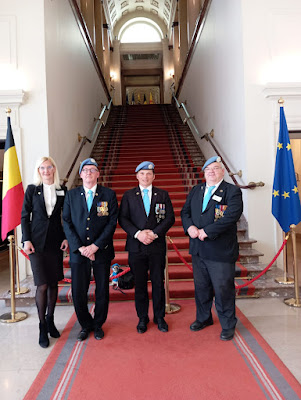Remembrance Day of the World War Second in Europe: remembering to unite.
 |
| Wreath Laying Ceremony |
8 May is a date that resonates with particular force in the heart of Europe. The final signing of the complete capitulation of Nazi Germany, after Reims, sealed by the signature placed in Karlhorst. The day of the end of the World War Second in Europe is not just a moment of triumph, it is above all a reminder of the fragility of peace, the price of freedom and the importance of human solidarity.
On 8 May 2025, we will mark the 80th anniversary of the end of the World War Second in Europe. This day is not just a historical date, but a profound symbol: of memory, pain, victory over evil and hope for peace. Today, eight decades later, we still need remembrance to resist the oblivion that breeds repetition of tragedies.
The Second World War (1939-1945), in which 62 of the 74 countries at that time took part, took millions of lives, divided continents, left destroyed and burned cities and villages, millions of dead soldiers and annihilated civilians. The Holocaust (Shoah). The war showed the heroism of the Resistance movement and the tragedy of betrayal. The war left deep wounds in the memory of the peoples - Oradour, Charleroi, Brussels, Mons, Antwerp, Bastogne… Kragujewiec, Lidice, Babiy Yar, Drobicky Yar, Treblinka, Dachau, Auschwitz, Ravensbruck, Mauthausen - these and many other names will forever remain in the memory ... The war showed what totalitarianism, hatred and indifference lead to. That is why Remembrance Day is not only a tribute to the fallen, but also a moral obligation to future generations: to remember in order to prevent it from happening again. Today, when Europe and the world as a whole are facing new challenges – war, humanitarian crises, divisions within and without – the value of unity is becoming especially relevant. A united Europe was not built as a union of economies, but as a peace project. And the memory of the Second World War is a solid foundation for this project, reminding us that cooperation, mutual respect and the protection of human dignity are more important than national egoism and political calculation.
We must not only honour the past, but also defend what millions died for – the right to live in peace, to be different, but united. This is precisely the living power of memory and its relevance today.
In Brussels, in the very heart of the European continent, at the Congress Column, a solemn ceremony dedicated to this round anniversary took place. AISP/SPIA Belgium delegation visited the commemorative events . The delegation was headed by Tibor Albert, Vice President of Western Europe of the International Association of UN Peacekeepers "Soldiers of Peace" (AISP-SPIA), Serhii Samoilov, Director of Youth Programs of the AISP/SPIA, founder of the international projects "School of Peace" and "Young Peacemaker. The memorial event was attended by a representative of His Majesty the King, the Deputy Commander-in-Chief of Defence, he heads of embassies and military attachés of the EU, USA and Ukraine were present, representatives of veteran and patriotic, civil organizations. Particularly important was the presence of three surviving participants of the war, bearers of precious and important memory.
Representatives of the youth spoke in three languages, French, German and Dutch. Words of gratitude were expressed to the soldiers who died for freedom, and calls for the unity of the peoples of Europe were made. Such events do not simply honor the past - they remind us that peace is not given once and for all, it requires constant effort, dialogue and courage to defend common values. During the event, wreaths were laid, a minute of silence was observed, and an F-16 fighter jet and a historic Spitfire flew over the site of the ceremony, symbolizing the connection between generations and the continuity of memory.
But today's day of remembrance was overshadowed by a bitter context. There is a war going on in Europe again. Ukraine, a country that once fought shoulder to shoulder with the Allies against Nazism, is today fighting for its independence, sovereignty and human dignity, defending them in the war with Russia. And herein lies a terrible historical paradox: the descendants of those who once liberated Europe together now find themselves on opposite sides of the barricades. This makes the call for peace especially acute, and memory even more relevant.
80 years after World War Second, Europe is once again facing tests of strength. And now, more than ever, we need to remember why the European Union was built, why international security institutions were created, and why cooperation is more important than hostility. Memory is not only a look back, but also a compass for the future.
 |
The legendary Spitfire in the sky of Brussels. |
 |
AISP/SPIA delegation at Senate. |